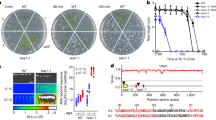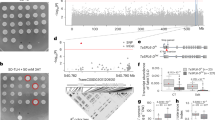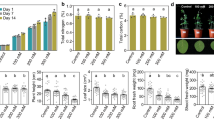Abstract
DISTURBANCES in the metabolism of phosphate and of carbohydrate in zinc-deficient tomato plants led Reed1 to suggest the occurrence of “some block in the enzyme system which controlled a fundamentally important process in the utilization of sugars”. Warburg and Christian2 had found a relationship between zinc and the enzyme zymohexase (aldolase) in yeast. Reed1 suggested that a similar relationship might exist in a complex organism such as a tomato plant.
This is a preview of subscription content, access via your institution
Access options
Subscribe to this journal
Receive 51 print issues and online access
$199.00 per year
only $3.90 per issue
Buy this article
- Purchase on Springer Link
- Instant access to full article PDF
Prices may be subject to local taxes which are calculated during checkout
Similar content being viewed by others
References
Reed, H. S., Amer. J. Bot., 33, 778 (1946).
Warburg, O., and Christian, W., Biochem. Z., 314, 149 (1943).
For method of aldolase assay, see Sibley, J. A., and Lehninger, A. L., J. Biol. Chem., 177, 859 (1949).
Author information
Authors and Affiliations
Rights and permissions
About this article
Cite this article
QUINLAN-WATSON, T. Aldolase Activity in Zinc-deficient Plants. Nature 167, 1033–1034 (1951). https://doi.org/10.1038/1671033b0
Issue Date:
DOI: https://doi.org/10.1038/1671033b0
This article is cited by
-
Accumulation of starch in Zn-deficient rice
Rice (2012)
Comments
By submitting a comment you agree to abide by our Terms and Community Guidelines. If you find something abusive or that does not comply with our terms or guidelines please flag it as inappropriate.



